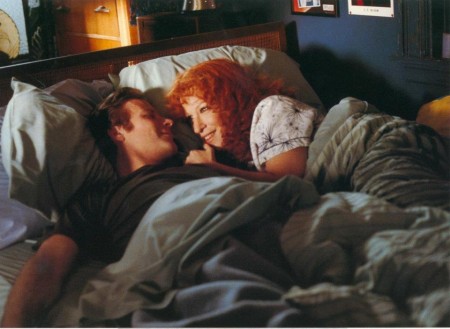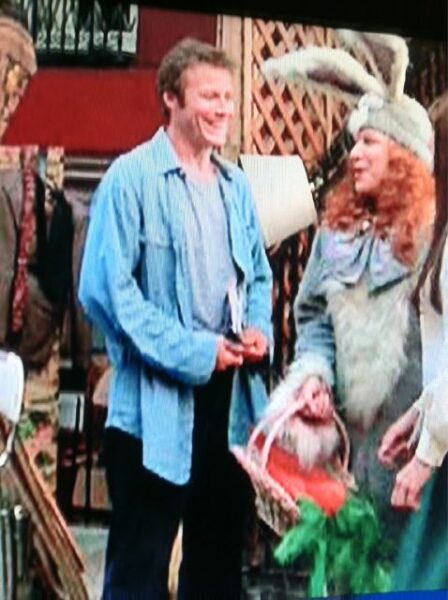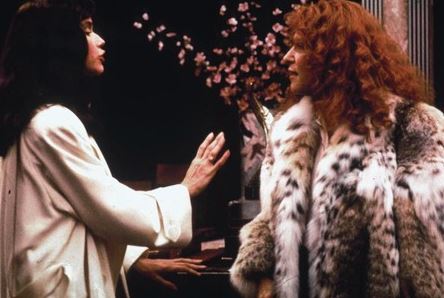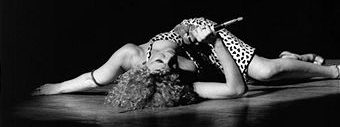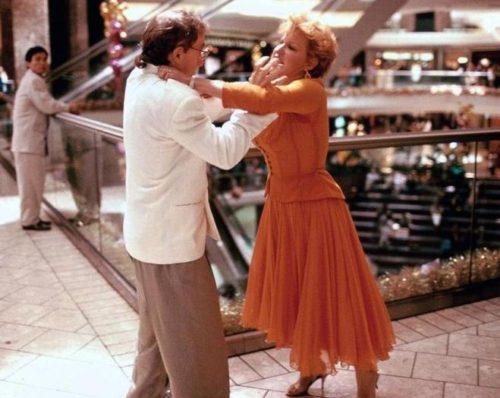Village Voice
You Know You Are Watching a Garry Marshall Movie When…
Middlebrow hero
By Eric Hynes Wednesday, Dec 7 2011
Garry Marshall gives you what you came for. “A dollar’s work for a dollar’s pay” is how Marshall mainstay Hector Elizondo puts it in The Flamingo Kid. Although he started as a TV joke writer alongside Mel Brooks and Woody Allen, this 77-year-old Bronx baby never blossomed into an auteur or ideas man, even if he has been a brand name since Happy Days became a national institution in the mid 1970s. Director of such massive crowd-pleasers as Beaches and Pretty Woman, Marshall’s an entertainer of the old school, still plugging away in Hollywood, hitting his marks and making the audience laugh or cry on cue. There’s an economy to his filmmaking (Beaches is one lean, mean, emotion machine . . .), but also a vacancy (. . . with a sole purpose of making you weep when Bette Midler sings “Wind Beneath My Wings”). Which made him the ideal helmsman for last year’s Valentine’s Day and this week’s New Year’s Eve, stunt-casted films that fulfill the promise of their posters and cram too many movie stars into too tight a space. Watching Marshall’s late-career movies is like watching a jigsaw puzzle snap together, one cameo at a time. In that spirit, let’s take a look at the pieces that make up a Garry Marshall Movie.
The King of Dramedy
Marshall’s plan has always been to bundle comedy and drama into an all-purpose package. (Even his classic sitcoms–The Odd Couple, Laverne & Shirley–were basically fables with punchlines.) That these dramedies were often neither funny nor persuasive–the shampoo + conditioner of cinema–seemed less problematic in the 1980s, when character-based storytelling was still considered mainstream entertainment, and two stars, a few laughs, and one fatal disease could amount to decent box office. Nothing in Common (1986), which starred the decade’s dramedic boy wonder Tom Hanks as a hotshot ad man who’s forced to tend to his philandering, ailing father (Jackie Gleason), toes a line between self-serious and ludicrous (witness Hanks and love interest Sela Ward get horny watching racehorses mate to a Richard Marx song); while non-steamy S/M potboiler Exit to Eden never decides if it’s mocking or celebrating Rosie O’Donnell in leather and lace. But nothing in the Marshall oeuvre compares to Overboard (1987), a deconstructed dramedy and sub”“Swept Away monument to misogyny in which a carpenter (Kurt Russell) makes a rich bitch suffering from amnesia (Goldie Hawn) into his personal slave . . . until Marshall swaps out the hillbilly banjo score for twinkling piano and sells his felonious gargoyles as morally upstanding romantics who fall in love. Fully segregating cynicism from schmaltz–the comedy from the drama–Marshall’s left with two harrowing halves.
Rich Man, Poor Man
Overboard was uncommonly crass for a Marshall movie, but its exaggeration of upper-class entitlement has echoes in everything from Pretty Woman to The Princess Diaries. Every polo pitch, country club, tennis court, luxury yacht, or marble-floored mansion is subject to fish-eyed ridicule and populated by people who learned diction from Mr. Belvedere. Conversely, Marshall makes a working-class hero of anyone with a union card. Elizondo, who has collected a check for every Marshall joint to date, often serves as the blue-collar conscience of the film, whether he’s playing a benevolent hotel manager in Pretty Woman, a Slavic postal worker in Dear God, or a straight-talking limo driver in The Princess Diaries. (My favorite is the outlier: his turn as a cross-dressing gangster in Young Doctors in Love). Yet Marshall’s films always manage to reinforce the status quo, appreciating professionalism but not ambition (the latter’s a bitter epithet in Beaches) and pitting career against family (Nothing in Common, Raising Helen). Excellence can be admired in small doses, but relatability is always paramount. (We’re drawn to Juliette Lewis’s innocent, unpretentious Carla in The Other Sister, not Diane Keaton’s tony, judgmental mom and feel our allegiance shift the moment that Bette Midler moves into a fancy apartment in Beaches). It’s like he has read our middle-American minds.
Life Is a Fairy Tale
Several of Marshall’s movies have riffed on the fairy-tale form–Anne Hathaway is a worthy protégé of a regal Julie Andrews in The Princess Diaries, and Julia Roberts is more commitment-phobic prince than princess in Runaway Bride–but none as fascinatingly as Pretty Woman. A modern mash-up of Cinderella and Pygmalion, the film is most compelling as a fantasy of Los Angeles, where Beverly Hills and the Sunset Strip represent mirror opposites of the same dream. But first there’s a pickup. Atypical for a filmmaker who likes to hustle between hot spots (character and scene development be damned), the opening scene of Pretty Woman progresses unhurriedly, letting its actors acclimate themselves to each other (and us) in what seems like real time (30 minutes–a quarter of the film’s running time). The fairy tale begins the morning after, when Richard Gere’s morose business tycoon makes Julia Roberts’s streetwalker a princely offer, but not before she services him while chewing gum and watching I Love Lucy. (Have I mentioned that Disney bankrolled this film?) Of course, the sexual politics are dicey, but between its oddly frank first act and two charismatic lead performances, it’s actually pretty marvelous.


